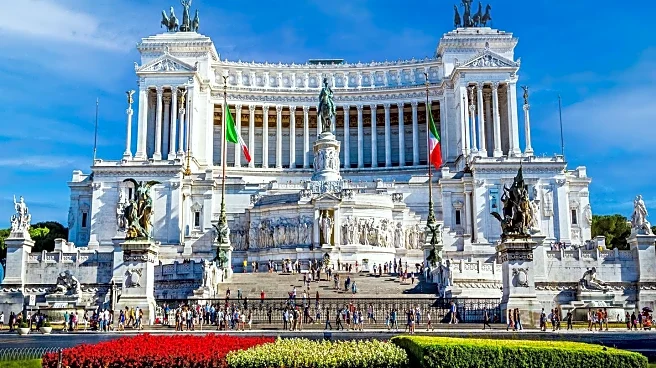What's Happening?
The Colonna Palace in Rome, a private home-museum, remains one of the city's most exclusive tourist sites, with limited access granted to small groups of visitors. The palace, owned by the Colonna family since the 12th century, is renowned for its baroque
architecture and extensive collection of paintings, sculptures, and tapestries. Despite its historical significance, the palace is not open to mass tourism, with entry restricted to guided tours for small groups on Friday and Saturday mornings. The family maintains a trust to ensure the artworks remain within the palace, preserving its cultural heritage. The palace has hosted rare events, such as the release of Pope John Paul II's book and a Metropolitan Museum of Art exhibition, attended by notable figures like Donna Versace and Anna Wintour.
Why It's Important?
The Colonna Palace's approach to tourism highlights the tension between preserving cultural heritage and accommodating public interest. By limiting access, the Colonna family aims to protect the integrity of the artworks and the historical significance of the palace. This strategy underscores the importance of safeguarding artistic heritage from commercialization, ensuring that the palace remains a site for those with a deep appreciation of history. The palace's exclusivity also reflects broader challenges faced by cultural institutions in balancing preservation with public engagement, a critical issue in the management of historical sites worldwide.
What's Next?
The Colonna Palace is likely to continue its policy of restricted access, focusing on preserving its artistic heritage while allowing limited public appreciation. Future events may be held at the palace, subject to the family's approval, potentially attracting high-profile guests and media attention. The ongoing preservation efforts by the Colonna family will ensure that the palace remains a significant cultural landmark, contributing to Rome's rich historical tapestry. As interest in cultural tourism grows, the palace's approach may serve as a model for other historical sites seeking to balance preservation with public access.
Beyond the Headlines
The Colonna Palace's preservation efforts highlight ethical considerations in cultural heritage management, emphasizing the responsibility of private owners to protect historical assets. The palace's history, intertwined with the legacy of the 'black nobility,' offers insights into the complex relationship between art, power, and politics. The family's commitment to maintaining the palace's integrity reflects broader cultural values, underscoring the importance of historical continuity in a rapidly changing world.















